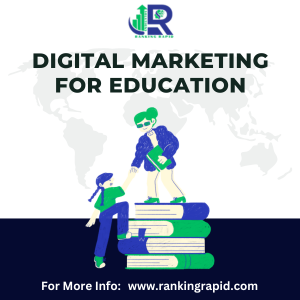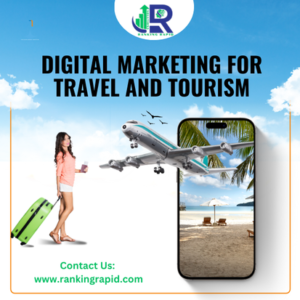Digital marketing has transformed the way businesses and institutions interact with their audiences, and nowhere is this more apparent than in the education and travel & tourism sectors. Both industries are heavily reliant on information sharing and audience engagement, making digital marketing strategies a cornerstone for growth and sustainability. In this blog, we will explore how digital marketing is reshaping these sectors, with a focus on effective strategies, challenges, and the impact of technology. We will also delve into key digital marketing strategies that both the digital marketing for education and travel sectors can employ to build their brands and enhance engagement.
1. Digital Marketing for Education
The education sector has evolved significantly in recent years, with schools, colleges, universities, and online learning platforms increasingly adopting digital marketing strategies to reach prospective students. Digital platforms provide educators with a cost-effective and efficient way to engage with a global audience.
The Importance of Digital Marketing in Education
In the digital age, educational institutions are no longer bound by geographical limitations. Students from around the world can access quality education online, and institutions are competing on a global scale. Here’s why digital marketing is essential for the education industry:
- Increased Reach: Digital marketing allows educational institutions to target students locally, nationally, and internationally. With the right SEO strategies, schools can ensure that they are visible to students searching for relevant courses or programs.
- Engagement: Through social media, content marketing, and email campaigns, educational institutions can engage directly with students, providing real-time information and personalized responses.
- Brand Building: Like businesses, educational institutions must build a strong brand to stand out. Digital marketing allows them to convey their unique strengths and offerings.
Key Digital Marketing Strategies for Education
- SEO (Search Engine Optimization) for Education SEO is crucial for ensuring that educational institutions appear at the top of search results when prospective students search for relevant programs, courses, or learning platforms. Targeting the right keywords—such as “online MBA,” “best universities for engineering,” or “study abroad programs”—is essential for increasing organic traffic. Both on-page SEO (focusing on optimizing content, meta tags, headers, and URLs) and off-page SEO (building backlinks from reputable websites) are fundamental.
- Content Marketing Quality content is the backbone of successful digital marketing for education. Educational institutions can create blogs, whitepapers, and videos about academic programs, career opportunities, and student testimonials. Video marketing, especially, has gained traction with webinars, virtual campus tours, and interviews with faculty and alumni providing valuable insights to prospective students.
- Pay-Per-Click (PPC) Advertising PPC campaigns on platforms like Google, Facebook, and LinkedIn allow educational institutions to target specific demographics based on age, location, academic interests, and career goals. Institutions can use PPC to promote their courses, scholarships, and events like open days and webinars.
- Social Media Marketing Social media platforms such as Instagram, Facebook, Twitter, and LinkedIn are ideal for engaging with prospective students. Instagram and Facebook allow institutions to showcase their campus life and success stories, while LinkedIn is effective for promoting graduate programs and professional courses.
- Email Marketing Educational institutions can use email marketing to nurture leads. Personalized email campaigns are effective in keeping students informed about deadlines, scholarships, and campus news. Automated drip campaigns can guide potential students from inquiry to enrollment.
- Influencer Marketing Influencer marketing is growing in popularity within the education sector. Institutions partner with educational influencers, bloggers, and YouTubers who share experiences and provide recommendations. These influencers can reach large student audiences, making them a valuable asset for recruitment.
- Mobile Optimization With more students using smartphones to research educational programs, it is essential that educational institutions have mobile-optimized websites. A smooth, user-friendly mobile experience will keep prospective students engaged and likely to apply.
Challenges of Digital Marketing in Education
Despite its many advantages, digital marketing in education does come with its challenges:
- High Competition: The education sector is highly competitive, and institutions must invest heavily in marketing to stand out.
- Complex Buyer’s Journey: The decision-making process for prospective students is lengthy, requiring multiple touchpoints to convert interest into enrollment.
- Data Privacy: Educational institutions must be cautious of student data privacy laws when collecting personal information for marketing purposes.
2. Digital Marketing for Travel and Tourism
The travel and tourism industry is one of the largest global industries and has been significantly impacted by digital marketing. In today’s digital landscape, travelers rely heavily on online resources to plan their trips, book accommodations, and choose destinations. This makes digital marketing essential for travel businesses to remain competitive and attract global travelers.
The Importance of Digital Marketing in Travel & Tourism
Digital marketing has revolutionized the travel and tourism industry by empowering travelers to access information, make decisions, and book experiences with just a few clicks. Here’s why it plays a pivotal role:
- Global Reach: Travel agencies, hotels, airlines, and tourist destinations can now market their services to potential travelers worldwide.
- Consumer Trust: Through online reviews, social proof, and influencer marketing, the travel industry can build trust among consumers.
- Personalization: Digital marketing allows travel businesses to tailor their marketing efforts to the individual preferences of travelers, creating personalized offers and experiences.
Key Digital Marketing Strategies for Travel and Tourism
- SEO for Travel and Tourism SEO is crucial for any travel business looking to attract organic traffic. Travel companies should optimize their websites with keywords that potential travelers are likely to search for, such as “best hotels in Bali,” “cheap flights to Europe,” or “family vacation ideas.” Optimizing meta tags, and descriptions, and using local SEO to appear in searches for specific destinations or attractions are also key strategies.
- Content Marketing Content marketing is central to travel marketing. Travel blogs, guides, itineraries, and videos provide travelers with the information they need to plan their trips. Video marketing, especially, is a powerful tool in this industry. Travel vlogs, destination walkthroughs, and hotel or resort tours give potential travelers a preview of their experience, increasing the likelihood of conversion.
- Social Media Marketing Social media platforms like Instagram, YouTube, Facebook, and Pinterest are perfect for showcasing travel experiences. With beautiful visuals and inspiring posts, travel businesses can entice potential customers. User-generated content—such as travel photos, reviews, and stories—creates authentic engagement and trust. Platforms like Instagram and YouTube, in particular, thrive on visuals, which are key to evoking emotions and inspiring travel.
- Pay-Per-Click (PPC) Advertising PPC campaigns on Google and social media platforms allow travel companies to target potential customers based on their search behavior, location, and interests. Keywords such as “last-minute deals” or “luxury holidays” can help attract different segments of the market. Dynamic retargeting ads can also be used to remind travelers of previous searches or bookings they’ve abandoned.
- Influencer Marketing Travel influencers, bloggers, and vloggers play a massive role in shaping travel decisions. These influencers share their personal travel experiences, offer recommendations, and showcase destinations to large audiences. Collaborating with influencers who have a strong following can help travel businesses reach new customers and build brand trust.
- Email Marketing Email marketing is an effective tool for nurturing leads and retaining customers. Travel businesses can send personalized travel recommendations, special offers, and reminders for upcoming trips. For repeat customers, loyalty programs can be promoted through email, offering exclusive deals for frequent travelers.
- Mobile Marketing Mobile optimization is essential in the travel industry. Many travelers use their smartphones to research and book their trips. Travel websites must be mobile-friendly, with easy navigation, fast loading times, and a seamless booking process. Additionally, mobile apps for hotels, airlines, and travel agencies can enhance the overall user experience by offering personalized features, such as booking reminders, local recommendations, and in-app support.
Challenges of Digital Marketing in Travel and Tourism
Although digital marketing has opened up new opportunities for travel businesses, the industry faces several challenges:
- Seasonality: Travel demand often fluctuates based on seasons, requiring businesses to adjust their marketing strategies throughout the year.
- High Competition: The travel industry is incredibly competitive, especially with the rise of online travel agencies (OTAs) and aggregators. This competition can drive up the cost of PPC campaigns and other paid strategies.
- Changing Consumer Behavior: Post-pandemic, travelers’ priorities have shifted, with more focus on safety, flexibility, and sustainable travel. Travel companies must adapt to these changing preferences in their marketing campaigns.
3. The Intersection of Digital Marketing in Education and Travel
While education and travel may seem like disparate industries, both share common ground when it comes to digital marketing strategies. Personalization, content marketing, and SEO play equally vital roles in both industries, aiming to guide prospective students and travelers along a journey of discovery and decision-making. Each sector relies heavily on mobile marketing, user experience optimization, and influencer marketing to engage and convert customers.
In conclusion, digital marketing has become an indispensable tool for both education and digital marketing for travel & tourism industries. In a world where online interactions dominate, the ability to engage with audiences through SEO, content marketing, social media, and personalized campaigns is critical for success. The key is to remain adaptable, embrace new technologies, and continuously refine marketing strategies to stay ahead of the competition. Whether you are a university trying to attract international students or a travel agency aiming to showcase the best vacation spots, digital marketing offers limitless opportunities to connect with your target audience.










